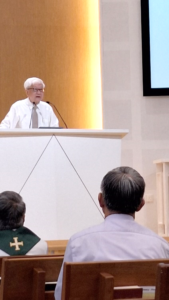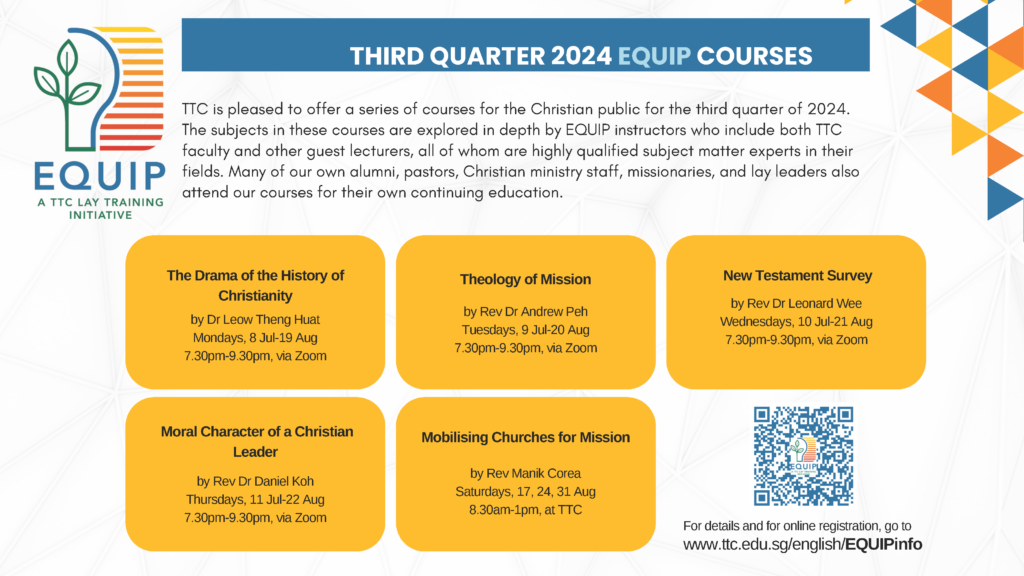The Macedonian Call

On Sunday 24th Sep, Rev Dr John Tay delivered his sermon on The Macedonian Call based on the book of Acts, chap 16. Thereafter, we sang the hymn “Send the Light”, reproduced in part here:
Verse 1
There’s a call comes ringing o’er the restless wave,
“Send the light! Send the light!”
There are souls to rescue, there are souls to save,
Send the light! Send The light!
Verse 2
We have heard the Macedonian call today,
“Send the light! Send the light!”
And a golden off’ring at the cross we lay,
Send the Light! Send the light!
The Macedonian Call was a vision that the Apostle Paul received during his second missionary journey. At the time, Paul and his companions were planning to travel to Asia, but they were prevented from doing so by the Holy Spirit. Instead, they were led to Troas, a city on the coast of what is now Turkey. There, Paul had the vision of a man from Macedonia standing before him and pleading with him, “Come over to Macedonia and help us.” (Acts 16:9)
The Macedonian call represents the cry of the lost world for the light of the gospel. The call is urgent, as there are souls to rescue and souls to save. The hymn challenges Christians to respond to this call by sending the light of the gospel to all corners of the globe.
One might think that Paul could have ignored the call since Macedonia was far away. Besides, he and his companions originally wanted to preach the gospel in Asia, but the Holy Spirit forbade them (Acts 16:6). However, he immediately understood that this was a call from God. So, the next morning, he and his companions set sail for Philippi, the first city in Macedonia.
There were daunting challenges in the mission, such as the following:
- Opposition from the Jewish authorities. When Paul and Silas arrived in Philippi, they were followed by a slave girl who was possessed by an evil spirit of divination. The masters of the slave girl were making money from her divination, so they were angry when Paul cast the spirit out of her. (Acts 16:16-19) The masters of the slave girl dragged Paul and Silas before the city magistrates and accused them of being Jews who were disturbing the city and preaching customs that were unlawful for Romans to accept. (Acts 16:20-21)
- Opposition from the Roman authorities. The magistrates in Philippi ordered Paul and Silas to be beaten and imprisoned (Acts 16:22-24). This was a humiliating and painful experience for Paul and Silas, but they endured it because they were committed to preaching the gospel.
Despite the persecutions, Paul was successful in his mission to Macedonia. He established churches in Philippi, Thessalonica, and Berea. He also converted several prominent people, including Lydia (Acts 16:11-15) and the whole household of his jailor (Acts 16:34).
Rev Dr John Tay mentioned the unusual features in the story of Paul and Silas, including the way Paul and Silas were led to Macedonia, the significance of the gospel being spread from Asia to Europe, the way God brought good out of the disaster of Paul and Silas being beaten and jailed, the fact that Paul and Silas continued to pray and sing hymns in prison, the earthquake that opened the prison doors, and Paul’s use of his Roman citizenship to get out of prison.
These unusual features highlight the power of God in the life of Paul and Silas, and they also show how God can use even the most demanding situations to bring about his good purposes. It shows that the gospel could be preached and accepted even in the most pagan and hostile regions.
God provided guidance in Paul’s life. Even though Paul was prevented from preaching the gospel in some places, God still led him to the people who needed to hear it. We too can trust God to lead us in our lives, even when we don’t understand what He is doing.
In JCC Mission Month (October), we can relate our Mission Call to the Macedonian Call:
- Both are about obeying God’s call to share the gospel. In the Macedonian Call, Paul and his team obeyed God’s call to go to Macedonia. In Mission Month, we are called to obey God’s call to share the gospel with our neighbours, our community, and the world.
- Both are about going beyond our comfort zone. Paul and his team were comfortable staying in Asia, but God called them to go to Macedonia, a new and unfamiliar place. In Mission Month, we are challenged to go beyond our comfort zone and reach out to people we don’t know and places we’ve never been.
- Both are about trusting God. Paul and his team trusted God to lead them and provide for them as they went to Macedonia. In Mission Month, we are called to trust God to lead us and provide for us as we share the gospel and serve others.
The Macedonian Call is a splendid example of how God is using ordinary people to accomplish His extraordinary purposes. It also shows that God is sovereign over our lives. He directs our paths and uses us for His purposes, even when we don’t understand where He is taking us.
In Mission Month, Rev Anthony Loh says, “The mission is still the same after 2,000 years. God is calling us to participate in His mission to reconcile people to Himself and to one another and to restore the brokenness of our world.”
Having heard the Macedonian Call today, let’s do our part to make Mission Month 2023 a success!
John Lee








Responses